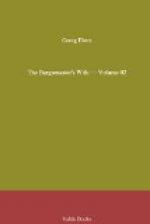“With artists and musicians?”
“Mere artists of noble sentiments. At times she surpassed them all in her overflowing mirth.”
“At times?”
“Yes, only at times, for she bad also sorrowful, pitiably sorrowful hours and days, but as sunshine and shower alternate in an April day, despair and extravagant gayety ruled her nature by turns.”
“A strange character. Do you know her end?”
“No, Fraulein. One evening she received a letter from Milan, which must have contained bad news, and the next day vanished without any farewell.”
“And you did not try to follow her?”
Wilhelm blushed, and answered in an embarrassed tone:
“I had no right to do so, and just after her departure I fell sick— dangerously sick.”
“You loved her?”
“Fraulein, I must beg you—”
“You loved her! And did she return your affection?”
“We have known each other only since yesterday, Fraulein von Hoogstraten.”
“Pardon me! But if you value my desire, we shall not have seen each other for the last time, though my double is undoubtedly a different person from the one I supposed. Farewell till we meet again. You hear, that calling never ends. You have aroused an interest in your strange friend, and some other time must tell me more about her. Only this one question: Can a modest maiden talk of her with you without disgrace?”
“Certainly, if you do not shrink from speaking of a noble lady who had no other protector than herself.”
“And you, don’t forget yourself!” cried Henrica, leaving the room.
The musician walked thoughtfully towards home. Was Isabella a relative of this young girl? He had told Henrica almost all he knew of her external circumstances, and this perhaps gave the former the same right to call her an adventuress, that many in Rome had assumed. The word wounded him, and Henrica’s inquiry whether he loved the stranger disturbed him, and appeared intrusive and unseemly. Yes, he had felt an ardent love for her; ay, he had suffered deeply because he was no more to her than a pleasant companion and reliable friend. It had cost him struggles enough to conceal his feelings, and he knew, that but for the dread of repulse and scorn, he would have yielded and revealed them to her. Old wounds in his heart opened afresh, as he recalled the time she suddenly left Rome without a word of farewell. After barely recovering from a severe illness, he had returned home pale and dispirited, and months elapsed ere he could again find genuine pleasure in his art. At first, the remembrance of her contained nothing save bitterness, but now, by quiet, persistent effort, he had succeeded, not in attaining forgetfulness, but in being able to separate painful emotions from the pure and exquisite joy of remembering her. To-day the old struggle sought to begin afresh, but he was not disposed to yield, and did not cease to summon Isabella’s image, in all its beauty, before his soul.




